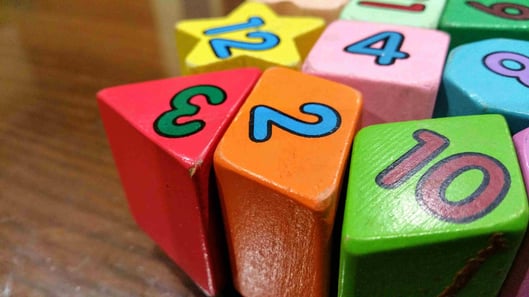
At what age should a child recognize numbers and letters? Typically, children begin to recognize numbers and letters around the ages of 2-3, with foundational skills continuing to develop as they grow. As parents, we often find ourselves eagerly tracking our children's developmental milestones, from their first steps to their first words. An important skill that holds significant weight in your child's early education is the ability to recognize numbers and write them independently. Numeracy skills are not only crucial for their academic success, but also for the everyday life of your child. Let us explore when children typically begin to master number writing and recognition, when kids should recognize numbers, and how you as parents can support your child's numerical journey.
The Early Years: Building Blocks for Numeracy Skills
Numeracy, just like literacy, starts to take root in a child's early years. It is important to remember that children develop at their own pace, and there is no one-size-fits-all answer to when kids should recognize numbers and writing. Understanding the number recognition age can help parents track progress while respecting individual differences. All children will progress differently based on personality. However, there are some general milestones that can help guide parents and caregivers:
Q: At What Age Should A Child Recognize Numbers and Letters?
A: Basic number recognition usually begins around ages 2-3. During this period, children can start identifying numbers from 1 to 10 through play, interactive activities, and books. Simple counting games, number flashcards, and number-themed stories are effective tools for building this foundation.
Q: When do children extend their number recognition skills beyond 10?
A: Around ages 3-4, children often extend their recognition skills up to 20. They may begin identifying numbers out of sequence and grasp basic number concepts such as "more" or "less."
Q: When do children typically start writing numbers?
A: Writing numbers often follows recognition. By ages 4-5, many children can write numbers 1 through 10. They may still face challenges in forming numerals correctly, which is a natural part of their learning process.
Q: What progress can be expected in number writing as children grow older? A: By ages 5-6, children often become more proficient at writing numbers up to 20. Their motor skills develop further, enabling them to form numbers with greater accuracy.
When Do Kids Recognize Numbers & What Age Do Kids Recognize Numbers?
- Typically Ages 2-3: At this stage, kids begin recognizing numbers from 1 to 10 during their toddler years. This early recognition often happens through play, interactive activities, and exposure to number-themed books.
- Expanding Skills by Ages 3-4: By age 3-4, many children extend their recognition skills up to 20. They may also start understanding basic concepts like "more" and "less," forming a solid foundation for further numeracy development.
- Reinforcing Practice and Consistency: Parents can support number recognition by incorporating counting games, flashcards, and everyday activities into routines. Consistent exposure helps children retain and build their skills effectively.
Consequences for Children Having Poor Mathematical Skills
Too often, there are children not being given the proper education in schools that they need in order to succeed in life. The failure of schools to teach the necessary material then falls on the shoulders of the child and causes them to bear the weight. There are plenty of downsides for children that were not educated well in mathematics. Here are a few:
- Academic Challenges - The most obvious issue that arises with a lack of development in mathematics from a young age, would be challenges in school as the child ages. Children who don’t make progress in their math skills early on, may struggle to keep up with peers as they get older and move up in their grade level. It is crucial to build a foundation of skills for the child to succeed more and more as they grow.
- Lower Confidence - Children who have poor math skills can become frustrated with struggling and lose confidence in themselves and their abilities. They may begin to doubt themselves in other subjects as a result of this, which could negatively impact their overall self-esteem.
- Career Limitations - Mathematics is a major skill for a lot of the science, technology, and engineering careers that are so popular in the world today. Without the critical mastery of basic math, children now may face limitations to their options for jobs in the future.
- Reduced Cognitive Development - There is a large benefit to the early development of mathematics in young children. Learning math can stimulate cognitive development in children including critical thinking, logic, and problem-solving skills. Children that miss out on this opportunity while they’re young, also miss out on all the benefits it could provide.
- Stress and Anxiety - Lastly, an important thing to keep in mind is how poor math skills can affect your child’s mental health. Children may feel inferior if they are not able to demonstrate certain math skills, which can lead to stress and anxiety in the child, whenever they are met with the challenge of doing math. Poor mental health in a child can cause a multitude of problems in their future lives.
Factors Influencing Numeracy Development
Numeracy development is influenced by various factors, including a child's individual abilities, exposure to numbers in their environment, and the quality of instruction and support they receive from their schools. Here are some important considerations of what you can do to ensure your child’s success:
- Parental Involvement- Parents play a crucial role in fostering numeracy skills. Engaging in number-related activities at home, such as counting objects, playing board games, or involving numbers in everyday tasks, can significantly impact a child's development.
- Additional Education- Enrolling your child in an after-school program, such as Genie Academy, can provide valuable early exposure to numbers and numeracy concepts in a structured environment. This learning center operates as a classroom setting in order for our students to feel ready to learn!
- Learning Style - Every child has a unique learning style. Some children may excel at numeracy from a very young age, while others may take a bit longer. Be patient and supportive while adapting your approach to your child's needs. Our team is here to help your child grow and work with you, as their parents.
- Individual Progress- Finally, it's essential to remember that children develop at different rates. Comparing your child's progress to others can create unnecessary stress for you and your child. Focus on their individual growth and celebrate their achievements, no matter how small they may seem.
The path to mastering number writing and recognition is a gradual process that begins in the early years of a child's life. While there are general milestones to guide parents, it's crucial to recognize and respect each child's unique pace of development. Encouragement, a supportive learning environment, and engaging activities are key elements in helping your child build strong numeracy skills. Remember that the goal is not just to meet arbitrary milestones like "what age should a child recognize numbers", but to foster a love for numbers and a solid foundation for a lifetime of mathematical learning. Therefore, be patient, and enjoy the process of nurturing your child's numerical abilities.
Genie Academy offers online and in-person math tutoring classes - including our innovative abacus mental math program. Learn more about our New Jersey math tutoring program and find a math tutoring program near you: math tutoring classes in Hillsborough, Plainsboro math tutor, elementary math classes in East Brunswick, South Plainfield math tutoring for kids, math tutoring service in South Brunswick, and Marlboro math classes.
Explore the math genie interactive abacus at Genie Academy to enhance your math skills with a hands-on, interactive learning tool designed for all ages. Start practicing today by visiting our abacus tool online free and take your mental arithmetic to the next level!





